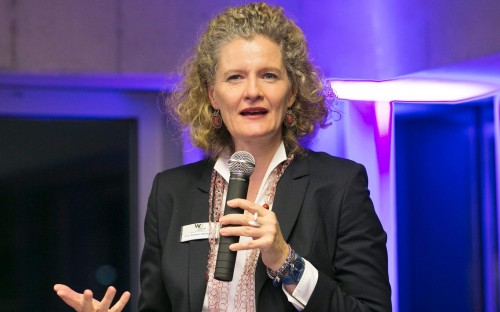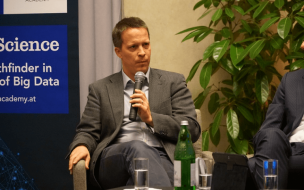Rather than residing in perennial gloom, she is optimistic that the business leaders of tomorrow can use current affairs as a learning opportunity and come out the other end better equipped to maneuver volatile, uncertain times.
On the Global Executive MBA (GEMBA) at WU Executive Academy, current affairs are influencing the way students are taught to think, Barbara explains.
“If you talked to someone in the business field with connections in the US or the UK, and asked how likely these events where to happen, the people operating in the business world said, ‘okay let’s not overestimate, everything will go smoothly.’
“But, then those things happened, and we see much more of those things happening every day, and I think this is exactly the challenges that companies are facing; this is not something you can foresee anymore, so how do you deal with situations where your traditional risk management tools and scenario techniques have come to a limit?”
Exposure to a multitude of cultures and business practices is part of the answer, Barbara implies. Understanding how to adapt to scenarios previously encountered gears students’ minds toward creative problem solving.
“I think getting a grip on what’s going on in the environment is important,” adds Barbara. “This is what we’re trying to do through International Residencies for the Global Executive MBA (GEMBA).
“I think this is something where diversity comes into place,” she explains. “If you look at where students come from, from other emerging markets all over the globe, they have been experiencing turbulence.”
The international residencies on the GEMBA program take students to the US, India, China, Argentina, and Brazil. While there they visit regional and international companies and learn about the distinct challenges businesses face in each country.
“When we talk about VUCA world this is where you find it taking place right now,” says Barbara. “And seeing these experiences and how managers deal with it around the world has a knock-on effect on your own style of leadership.”
Barbara admits that diversity and internationality are integral to the GEMBA program at WU Executive Academy. A typical cohort of 40-to-45 students features 26 nationalities.
“At this level you don’t only learn from faculty,” she asserts. Students bring with them their practical insights from around the globe. Faculty at this level, Barbara says, have a role beyond teaching. They moderate the student experience to optimize their learning from one another.
The GEMBA program at WU Executive Academy, for Barbara, is a platform for open communication and the development of collective intelligence among students.
“It’s about the discussion process and how to manage that,” she adds. “Dealing with it we have to find different tools and they are not easy to handle, or mathematically grasp. This is where Trump and Brexit have their effect as examples of the VUCA world and finding limitations in how to deal with it.”
VUCA extends to the digital transformation. Everyone talks about it, Barbara says, and is intent on finding a way to understand what is important and what you need to know as a leader about these topics, while finding a way to deal with issues surrounding them in a strategic way.
“It’s about familiarizing people with buzzwords like blockchain, artificial intelligence, data science,” Barbara says. “This is what we need to train, supporting them with the tools to do their job better than they’ve done it before.”
Thinking outside of the box and beyond borders is why Austria is an attractive destination for MBA students, according to Barbara.
“Being so small it has made a country that always had to look outside,” Barbara explains. “Looking outside of boundaries is something we have to do to survive. Everyone doing business here has always had an international focus.”
Geographically, the country is a “gateway” not only to the west, but also the east, Barbara adds. It offers an opportunity to gain experience dealing with difficult markets and a historical insight into managing during difficult and challenging times.
“When the Iron Curtain was removed we started to do business and serve as a bridgehead into the region, so I think as Austrians we always had to be flexible to deal with unforeseen [circumstances] as have our colleagues in CEE.”
The country has also just topped the Mercer Quality of Living Survey for the ninth year in a row, something Barbara thinks is a major swing factor for international students coming to WU Executive Academy.
“When you come to Vienna it’s the quality of life,” she explains. “Networking happens outside of the classroom, and the cultural highlights of Vienna are very special; that adds up to the overall picture of what Vienna can be as a city to study and live in.”







